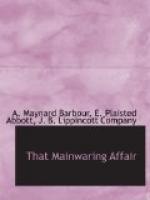“Very easily explained when you once take into consideration the fact that the whole thing was an elaborately arranged plan, on the part of the murderer, to give the affair an appearance of suicide. One glance at the murdered man convinced me that the wound had never been produced by the weapon lying at his side. That clue led to others, and when I left that room with you, to attend the inquest, I knew that Hugh Mainwaring had been shot with a 38-calibre revolver, in his library, near the centre of the room, and that the body had afterwards been so arranged in the tower-room as to give the appearance of his having deliberately shot himself beside his desk and with his own revolver.”
“By George! I believe you’re right,” said the attorney; “and I recall now your statement that day, that the shooting had occurred in the library; I wondered then what reason you had for such an opinion.”
“A small stain on the library carpet and the bullet told me that much. Another thing, which at first puzzled me, was the marked absence of blood-stains. There was a small pool of blood underneath the head, a slight stain on the carpet in the adjoining room, but none on the clothing or elsewhere. The solution to this I found on further investigation. The wound had been firmly and skillfully bandaged by an expert hand, the imprint of the bandage being plainly visible in the hair on the temples. Here is the proof that I was correct,” and Merrick held up to the attorney’s astonished view the stained and knotted handkerchief. “This, with the private keys belonging to Mr. Mainwaring’s library, was in that box at the bottom of the lake. Do you consider Mrs. LaGrange or Hobson capable of planning and carrying out an affair so adroitly as that?”
“You’ve got me floored,” the attorney answered, gazing at the proofs before him. “Hobson I know nothing about; but that woman I believe could scheme to beat the very devil himself; and yet, Merrick, when you think of it, it must have taken time — considerable time — to plan a thing like that.”
“Or else,” Merrick suggested, “it was the performance of an expert criminal; no bungling, no work of a green hand.”
Mr. Whitney started slightly, but the detective continued. “Another point: Hobson, as you say, was the one man whom Hugh Mainwaring feared and who evidently had some hold upon him; would he then have dared denounce him as a liar and an impostor? Would not his use of such terms imply that he was addressing one whom he considered a stranger and unacquainted with the facts in the case?”
“I see,” the attorney replied quickly; “you have in mind Hobson’s accomplice, the tall man with dark glasses.”
Merrick smiled. “You are then inclined to the opinion that J. Henry Carruthers, who called in the afternoon, is identical with the so-called Jack Carroll who accompanied Hobson in the evening?”
“Certainly that is a reasonable supposition. The descriptions of the two men agree remarkably, and the darkey was positive, both in his testimony at the inquest and in conversation with me, that they were one and the same person.”




